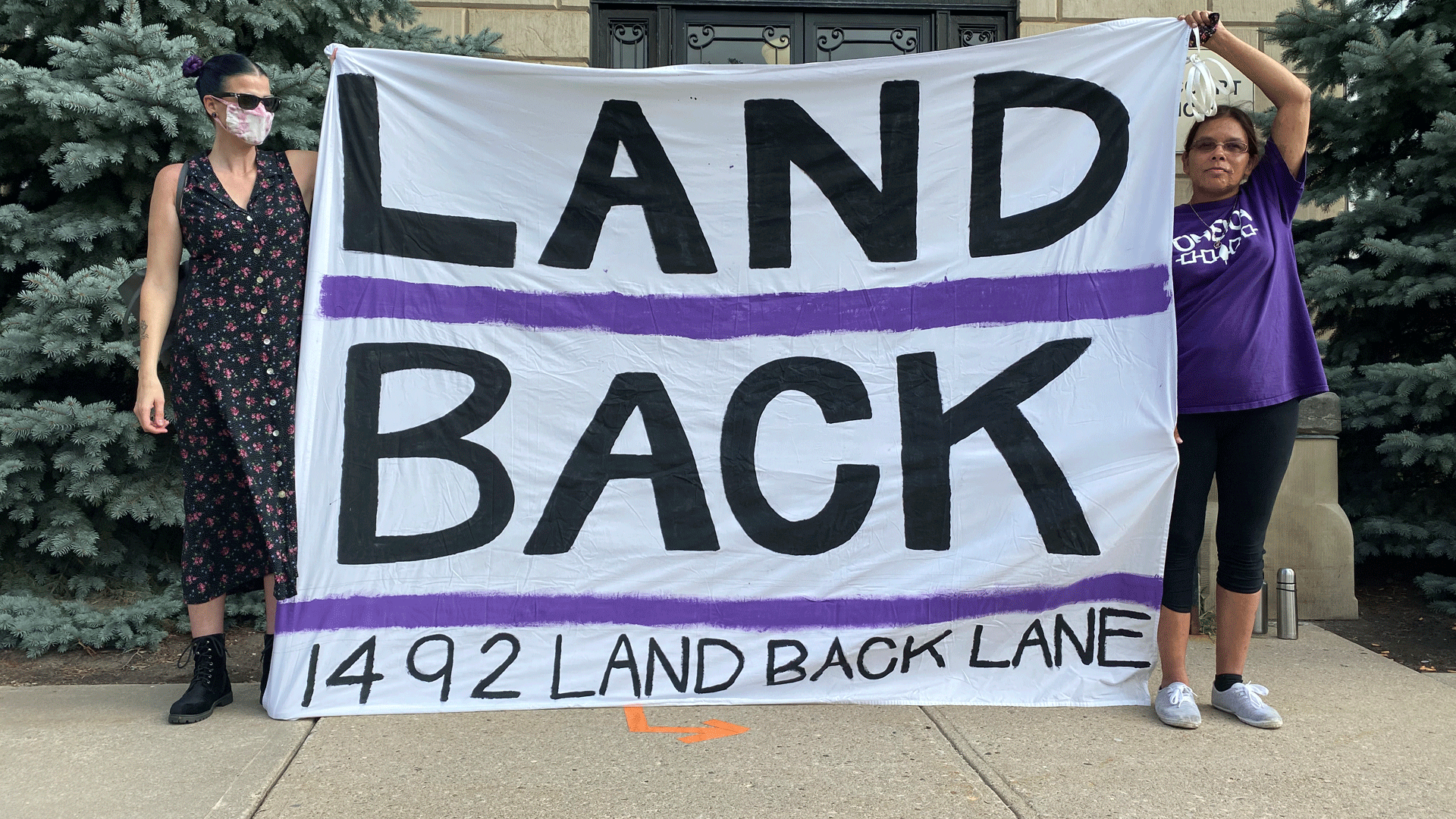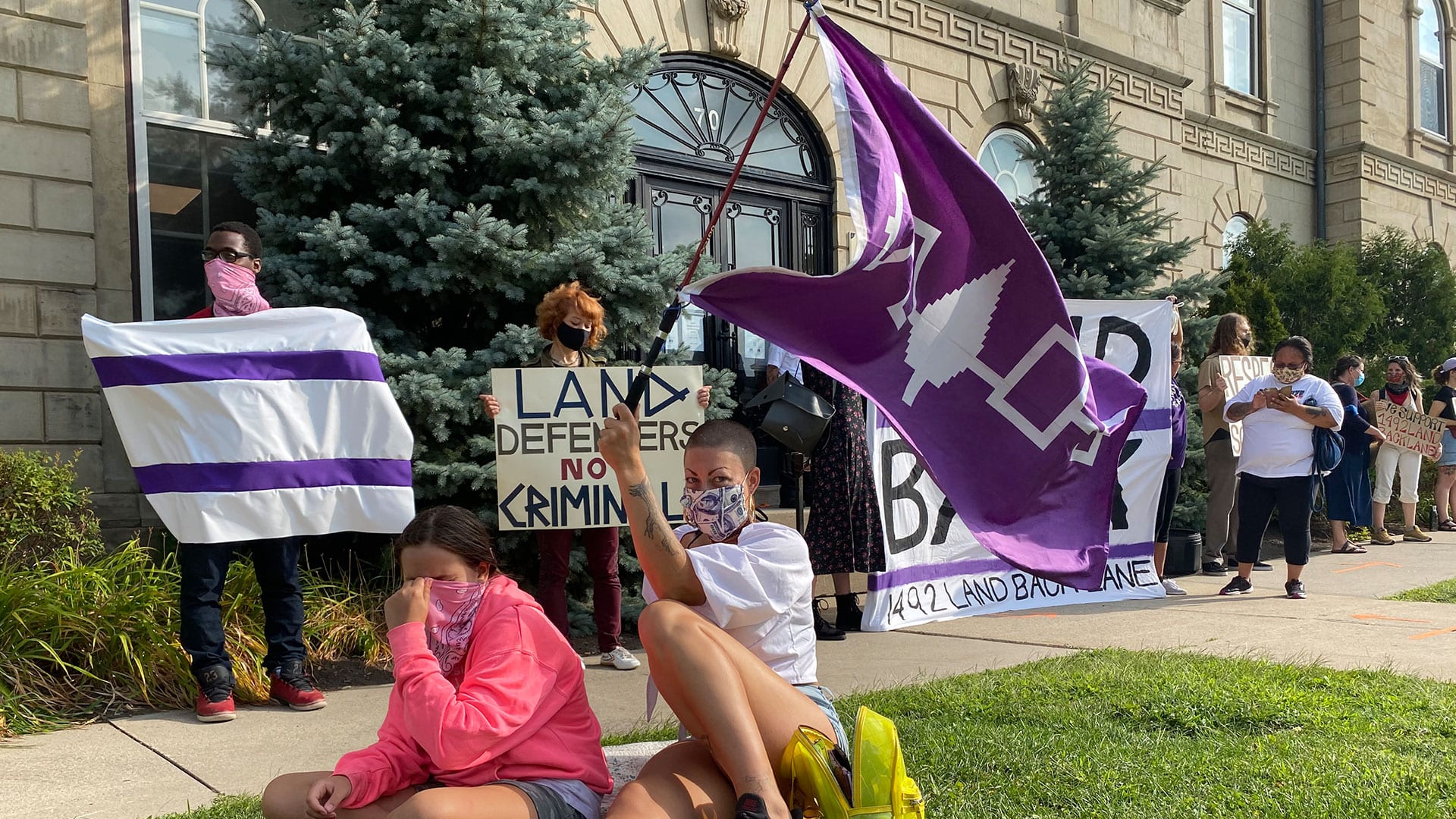After a two-hour hearing Tuesday morning in Brantford, Ont. an Ontario Superior Court judge extended two court injunctions preventing anyone from occupying the McKenzie Meadows construction site in Caledonia or hindering access to any roads in Haldimand County.
“The two injunctions remain in full force and effect,” said Justice R. John Harper, after hearing submissions from Foxgate Developments, Haldimand County and the Ontario Provincial Police (OPP).
Foxgate lawyer Paul DeMelo also moved that Skyler Williams of the 1492 Land Back Lane camp, which has reclaimed the housing development site as Haudenosaunee land, be named as a defendant in the proceedings, which the judge granted.
The defendants were previously named only as John Doe and Jane Doe. Lawyer Alex Smith attended remotely and said he expects to be retained as Williams’s counsel.
DeMelo referred to Williams’s daily Facebook updates as a “daily blog” and identified him as a leader of the occupation. Camp releases have identified Williams as a spokesperson.
In the lead-up to the hearing, Harper explained why he issued the two previous injunctions, recounted Foxgate’s evidence and harshly rebuked the actions of camp occupiers and those who blockaded roads in response to the Aug. 5 police raid on it.
“The civil and potentially criminal disobedience that is replete in eh (sic) evidence before me places that whole community in peril. Black burning tire smoke billowing into the air is as much a toxic health risk as it is a toxic emotional and psychological risk to the Haldimand community,” Harper says in a 20-page written decision delivered Aug. 21.
“Open and flagrant disregard for regular order, laws and orders of this court cannot be condoned or tolerated. If the rule of law is not upheld in the circumstances of this case, chaos, mayhem and anarchy would prevail,” he added. “This is not the way our Canadian society is. Central to our values is the rule of law. It applies to everyone, without exception.”

Haudenosaunee women pushed back in a statement they planned on reading to the court. The statement described injunctions and the court system as tools of colonial dispossession.
“Courts violate and criminalize the rights and responsibility of our women by preventing us from fulfilling our responsibilities to the land and our future generations in accordance with Haudenosaunee law,” said a copy shared with media.
“Our sovereignty is inherent while Canada’s perceived authority is a product of violent colonialism and genocide. Injunctions seek to make this reality invisible, a tool of the court to sanction more violence and dispossession.”
DeMelo said he had no problem with Six Nations members reading their statement, after a woman entered the courtroom and began speaking.
But Harper wouldn’t allow it. The judge ruled that any statement to the courts must go through the due process of the legal system.
“You can’t engage in reconciliation and consultations when the parties who are acting as protesters don’t engage in the process,” said Harper.
After an exchange with the judge, the woman left without making a full speech.
OPP lawyer Christopher Diana explained that police retain significant discretion in determining when and how police enforce any injunction.
“However, that discretion, and I want to be very clear about this, that discretion does not extend to whether or not to enforce a court order. Police services don’t get to decide that,” said Diana.
He explained the OPP has a two-pronged approach to dealing with Indigenous occupations or blockades. He said police use the Provincial Liaison Team (PLT) to try and negotiate, while also making operational preparations in case talks fail.
“The OPP will enforce your order if PLT is unable to effect a better resolution,” Diana assured Harper. “We hope it doesn’t come to that.”

A senior executive at Losani Homes, which co-owns Foxgate along with Ballantry Homes, also defended the proposed McKenzie Meadows subdivision, which has been occupied since July 19.
In a statement to APTN News, Vice-President and Chief Legal Officer William Liske said the company went through a rigorous diligence process, did not identify any Haudenosaunee claim over the disputed parcel and signed a support agreement with the elected council.
“Hundreds of homes have been approved and constructed without dispute in Caledonia during the past four years,” he said in an email. “Those other successful development projects operated under the same form of Definitive Agreement that we signed (with the band council).”
Liske said they did not believe there would be any risk in developing on the site, despite its proximity to Kanonhstaton, which members from Six Nations of the Grand River occupied in 2006 when it was set to become the Douglas Creek Estates.
“1535 McKenzie is right next to a mature residential subdivision and doesn’t share any common boundaries with Douglas Creek or Reserve lands,” he added. “That and the fact that a definitive agreement was reached with the Six Nations Elected Council confirmed that there was no anticipated risk for the project.”
Read More:
Six Nations land dispute needs time and care, but police raid may be imminent
The mayor of Haldimand County, where Caledonia is located, urged the federal government not to enter into any land talks while the reclamation camp remains occupied.
“I implore you to be very clear that no discussions are possible so long as third-party land is occupied and those that are financially tied to said land held ransom to the outcomes of your future discussions,” said Ken Hewitt in an address to Indigenous Services Minister Marc Miller and Crown-Indigenous Relations Minister Carolyn Bennett that was posted online Aug. 24.
Hewitt thanked Ottawa for finally taking steps to resolve Six Nations of the Grand River’s land claim, which was filed in 1995, but also issued a word of caution against making commitments while an injunction ordering the camp vacated remains in effect.
“That order must remain intact and all authorities including yourselves must consider the ramifications of any dialogue that begins without that order either being adhered to voluntarily (hopefully) or through the aid of the OPP in enforcing said order,” said Hewitt.
On multiple occasions, Hewitt has urged police to move in and enforce the injunctions.
In a phone interview on Aug. 18, APTN asked him how concerned he was about another possible escalation, given what happened after the first raid.
“It’s unfortunate that it has to get to that point,” he said. “I would much rather see the members of Six Nations and those on the site come to a solution that is much more manageable in not having a confrontation with police or anybody for that matter.”
However, Hewitt described the injunctions as “the only solution for us to move forward.”
“We have to get our roads open, we have to allow for commerce to continue, we have to support our developers and our builders, and that’s where we’re at,” he said.
Haldimand County lawyer Woodward McKaig argued that, even though all blockades were fully lifted as of Saturday afternoon, without an injunction there would be nothing stopping Six Nations people from erecting them again.
“I don’t want to say it’s an invitation for them to re-occupy or set up blockades on the road,” he said, but “it gives them the freedom to do so because there’s nothing precluding them from doing it right now.”
Harper agreed, calling the situation a “live controversy.” He gave Williams 20 days to prepare any evidence he would like to submit, with 15 days for anyone to respond.
A date for the next hearing has not been set.









